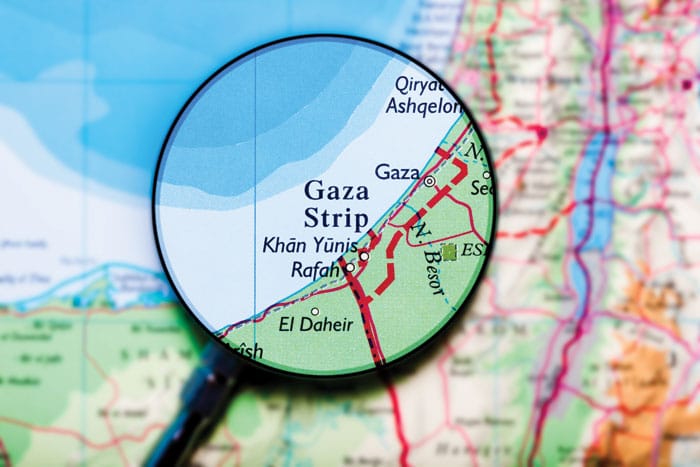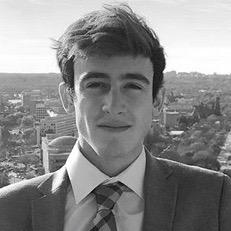 pawel.gaul/Getty Images
pawel.gaul/Getty Images I am currently fortunate enough to be staying in a beautiful apartment in Tel Aviv that peers over the entire metro area of Israel’s biggest city. To the west is the Mediterranean Sea, its grandeur breathtaking when it reflects a blue and clear sky. To the north are the skyscrapers of Israel’s burgeoning high tech and finance sector. And to the east is Ramat Gan, Petah Tikvah, and then a vast swath of green land that indicates passage into the West Bank. This land appears almost as close to my vantage point as the sea, emphasizing the miniscule size of Israel proper—just fifteen miles from the beach to the green line. Yet despite the magnificence of this view on a sunny day like today, a dark cloud hangs over the Jewish state.
As thousands of Ukrainian Jews protest Russia’s invasion of Ukraine in Tel Aviv’s Habima Square, Israeli diplomats and military officials are busy grappling with a European continent once again on the verge of war.
As thousands of Ukrainian Jews protest Russia’s invasion of Ukraine in Tel Aviv’s Habima Square, Israeli diplomats and military officials are busy grappling with a European continent once again on the verge of war. We Jews feel a strong connection to the latest news from the front lines, not only because many of our families hail from this region of the world or because President Zelensky is a Jew, but because the politics of war and siege greatly interest a people who have so desperately clung to their fragile power. To see this fragility up close and personal, simply gaze over the apartment balcony from which I write now.
I’d like to invite Maureen Murphy, the senior editor of Electronic Intifada magazine, to explain to me how she can reconcile this view of Tel Aviv with her latest inflammatory tweet, in which she asserts: “If you’re a Western liberal sympathizing with Ukrainians taking up arms against Russia right now, ask yourself why you haven’t sympathized with Hamas fighters in Gaza or Hizbollah in Lebanon. Why don’t you glorify their patriotic sacrifices?”
This statement is at best comical and at worst downright vicious. In trying to find the words to respond to it, I was reminded of Professor Ruth Wisse’s characterization of antisemitism as a “politics of inversion.” Throughout Jewish history, those who harbor animosity toward our people have repeatedly flipped on its head the reality of Jewish power or influence: The Christians accused the Jews of spreading the plague when it was in fact our customs that shielded us from deadly pathogens; the Nazis accused the Jews of dominating Germany when Jews were merely a tiny fraction of the population; and the Soviets accused the Jews of being a fifth column in Russian society when Jews were uniquely represented among loyal communists and Bolsheviks. Anti-Zionism that positions itself as sympathetic to Palestinians is in itself a politics of inversion, as it accuses the Jewish state of not allowing the formation of an Arab state (though Israel has in fact offered this very proposal many times,) when, in reality, it is the Arab states that have been intransigent in allowing the formation of a Jewish state in any borders, and have weaponized the Palestinian people to fight against it for nearly eighty years. While touring Tel Aviv this week, I learned of how isolated and demonized Israelis felt during the Second Intifada, believing the entire world had turned against them. This truism is tantalizing, considering it was the Israelis who had offered peace and negotiations, as opposed to the terrorism and violence coming from the other side of the table.
The war to eliminate Israel, similar to the war to lay claim on Ukraine and to prevent it from joining NATO, is a campaign of imperialism.
The war to eliminate Israel, similar to the war to lay claim on Ukraine and to prevent it from joining NATO, is a campaign of imperialism. Indeed, calls to free Palestine “from the river to the sea” are calls to install a hegemonic Middle East, where ethnic and religious minorities lose their right to sovereignty and readjust to their proper subordinate place in a hierarchy of power. This is, of course, not to say that the occupation of the West Bank and the blockade of the Gaza Strip are not pressing issues with their fair share of injustices perpetrated by both parties, but rather that the position in which Israel now finds itself is the result of defensive warfare against first the Arab League and now an imminently nuclear Iran. To view a tiny Jewish democracy facing genocidal ambitions since its independence and conclude that it represents Russia and that Hamas and Hezbollah, terrorist organizations dedicated to violent usurpation of Jewish civil liberties, represent Ukraine is libelous, antisemitic hate-mongering. Of course, this is nothing new for Electronic Intifada.
Maureen Murphy’s Twitter bio indeed contains the phrase “from the river to the sea” in Arabic, and yet her location reads as Chicago, and her website showcases her work in “botanical art” and “nature journaling.” Clearly she is not a freedom fighter in Gaza charging the border, and yet she feels inclined to speak for the Palestinians, whitewashing anti-Zionism as valiant resistance and gaslighting her readers by inverting the perception of Jewish power. This is not unlike Vladimir Putin attempting to frame the Ukrainian state as an artificial entity in the heart of Russian civilization, portraying Ukraine’s fighters as neo-Nazis and thugs, and cracking down on dissent in his own society by arresting moderates and objectors to violence. I’ve written in the past of the parallels between those who resent the West, NATO, and liberal democracy and those who resent Israel and its people, but nothing has made this more apparent than the behavior and words of radical activists and journalists during this horrible war.
Blake Flayton is New Media Director and columnist at the Jewish Journal.























 More news and opinions than at a Shabbat dinner, right in your inbox.
More news and opinions than at a Shabbat dinner, right in your inbox.